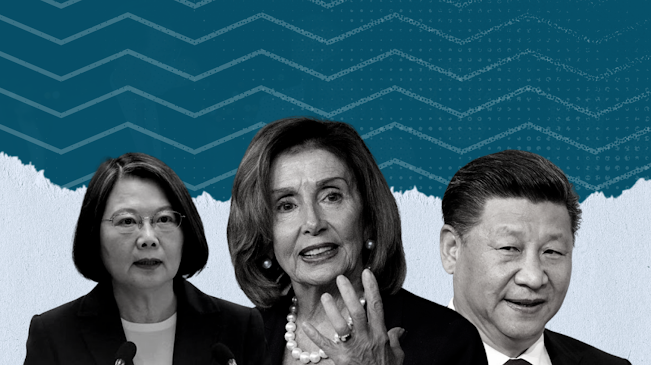EXPLAINER | Pelosi's World-Shaking Visit to Taiwan
By Sandra Cabangon
Risky. Historic. Exciting. Foreboding.
China didn’t fall short of broadcasting the negative repercussions of visiting Taiwan. Even the President said that the military thought it wasn’t a good idea right now. Despite these, US House Speaker Nancy Pelosi persisted. She went to Taiwan and expressed America’s ironclad determination to preserve democracy as the world is made to choose between democracy and autocracy — an act that provoked the Chinese government.
‘Those who play with fire will perish by it,’ China’s President Xi Jinping once said to US President Joe Biden. Now, China’s Foreign Minister Wang Yi calls Pelosi’s visit ‘manic’ and írrational’. Meanwhile, Taiwan calls Nancy Pelosi a friend of the country, honoring her even with a civilian award. President Tsai Ing-wen calls Pelosi "Taiwan's most devoted friend". In an interview with Taiwanese sales manager Eric Liu, he said, "It's unprecedented for Taiwan and my generation of Taiwanese. I felt quite excited, and also sensed the danger."
As tensions rise between China and US while Taiwan’s security and independence are threatened, what are the aftershocks of this world-shaking visit?
CHINA & THE US: FORTY YEARS AND FADING TRUST
Pelosi’s visit to Taiwan threatened to exhaust trust built between the two countries for the last 40 years. China perceived the house speaker's move to visit Taiwan as a threat mainly because China considers Taiwan as a part of its territory. Government officials, especially high ranking ones, visiting Taiwan would mean acknowledging its sovereignty. Nevertheless, the United States and China have not yet made any moves that will cause a change in their current relationship. This is because neither wishes to lose their mutual benefit in this situation — China’s best move would be to prevent US and Taiwan engagements without the use of force, while the US benefits with the “strategic ambiguity” card that it has been using to show support for Taiwan while not angering China.
Even though the house speaker’s visit to Taiwan did not induce war or any attacks on the United States, Taiwan, the one caught in the middle, is suffering because of this act.
CHINA & TAIWAN: SOVEREIGNTY VS. DEMOCRACY
While Taiwan receives the US’ support in its fight for democracy, China is angered by the US’ meddling on its sovereignty. As the Chinese Foreign Minister warned, “China will definitely take all necessary measures to resolutely safeguard its sovereignty and territorial integrity in response to the US Speaker’s visit. All the consequences arising therefrom must be borne by the US side and the ‘Taiwan independence’ separatist forces.”
As a consequence of Pelosi’s visit, China intensified its military exercises — with some of the exercises taking place to the east of Taiwan and dangerously close to Taiwan’s coast. There have even been some indications of missiles reaching the island. The live-fire exercises also take place near Taiwan’s major ports, which could affect trading. This scale of drills and military acts are of greater intensity than those that occured in the 1995-1996 Taiwan Strait Crisis.
Moreover, China blocked imports from Taiwan which include citrus, fish, and biscuits; it also stopped exporting natural sand to Taiwan. Cyberattacks that have presumably been launched from China also plagued government websites, Taiwanese stores, and government facilities.
This is only the beginning, however — as it is more than possible that China will intensify its efforts to alienate Taiwan by scaring its partners and making China’s goal of ‘reunification’ more attainable.
CHINA, THE PHILIPPINES, & TAIWAN: WHO ARE ALLIES?
Press Secretary Trixie Cruz-Angeles said that the Armed Forces of the Philippines and the Department of Foreign Affairs are closely monitoring China’s actions after Pelosi’s visit to Taiwan. As Inquirer.net quoted from the press secretary, the agencies “are closely monitoring the situation as they would in any other similar circumstance.” The Philippines may seem to be an outsider, a mere spectator in the rising tension between China and Taiwan as well as China and the United States, but it is more involved than one might think.
The Philippines is known to have given its best efforts to stay on the good side of China, especially during the Duterte administration. China is the Philippines’ top trading partner and the two countries have shown their camaraderie amidst the COVID-19 crisis. However, with the change in the administration and current international situation, things may take a turn.
Taiwan is negotiating with Japan and the Philippines to find alternative aviation routes according to the official Central News Agency (CNA). Meanwhile, the Philippines does not have any diplomatic ties with Taiwan. Whether or not the Philippines decides to help Taiwan or not will likely affect its relationship with China, like what happened with the United States.
The future paved by the highest-ranking official to visit Taiwan after 25 years is uncertain, but one thing is for sure — the relationships between China, the US, and Taiwan will inevitably change.

